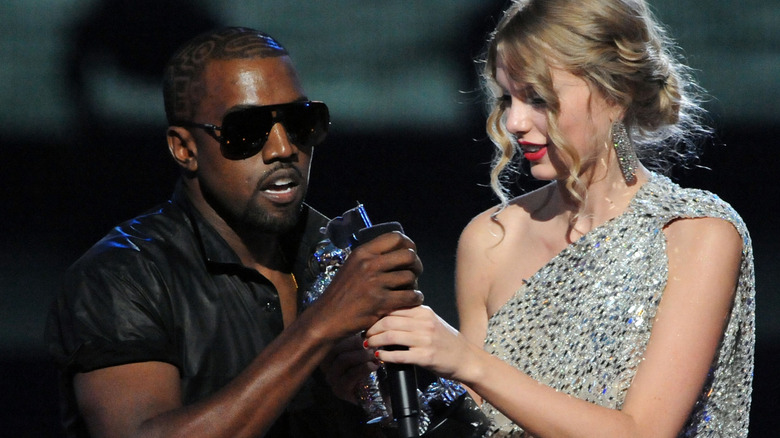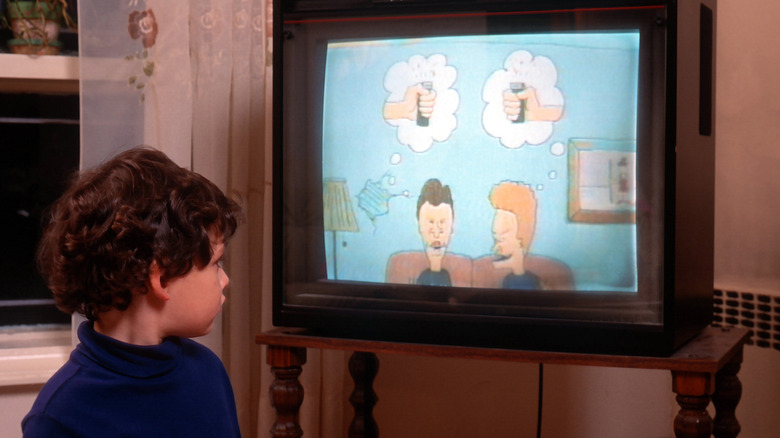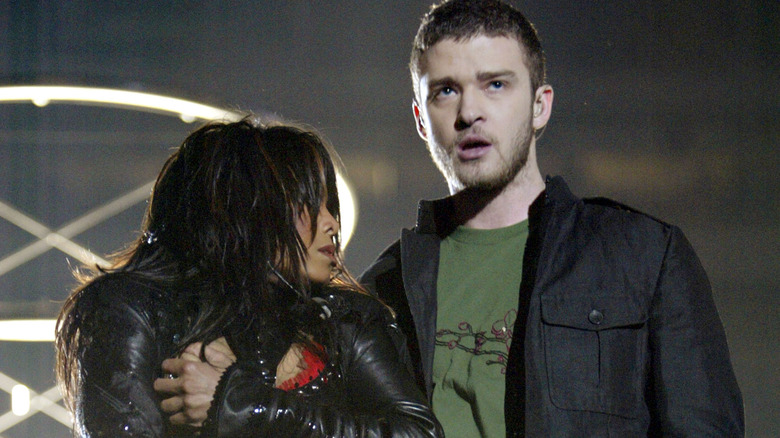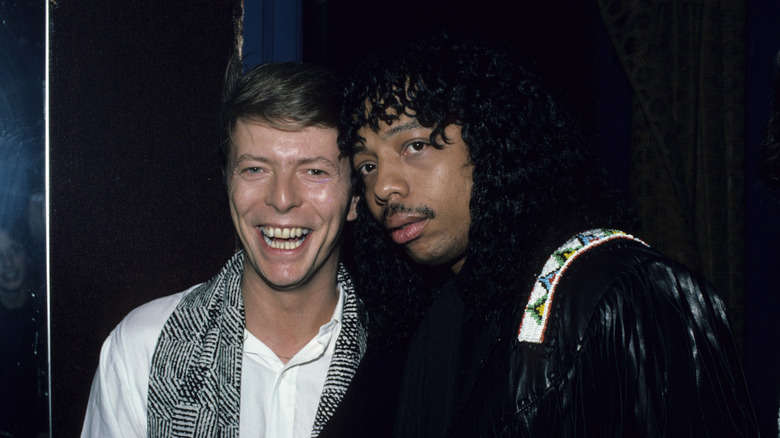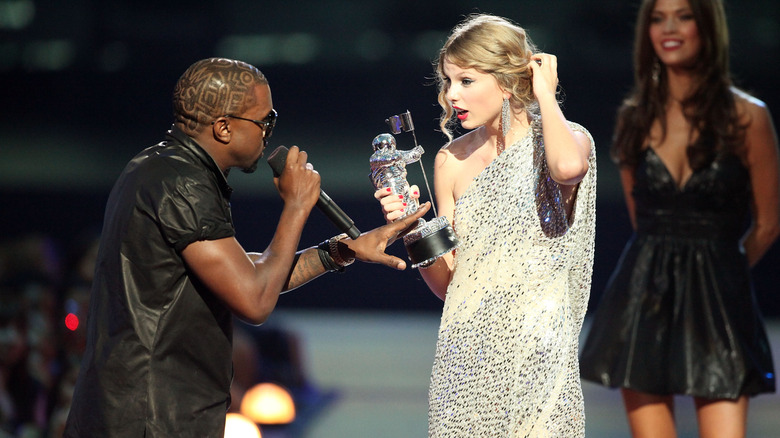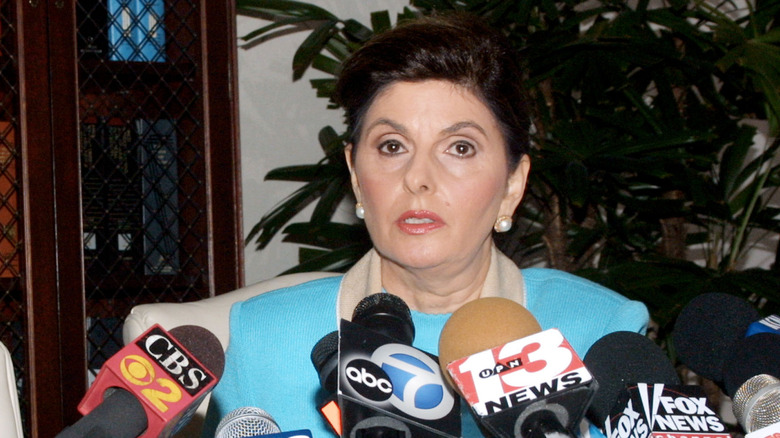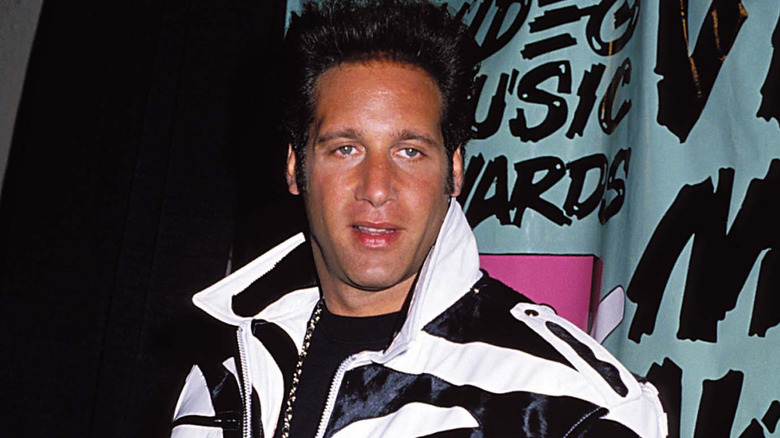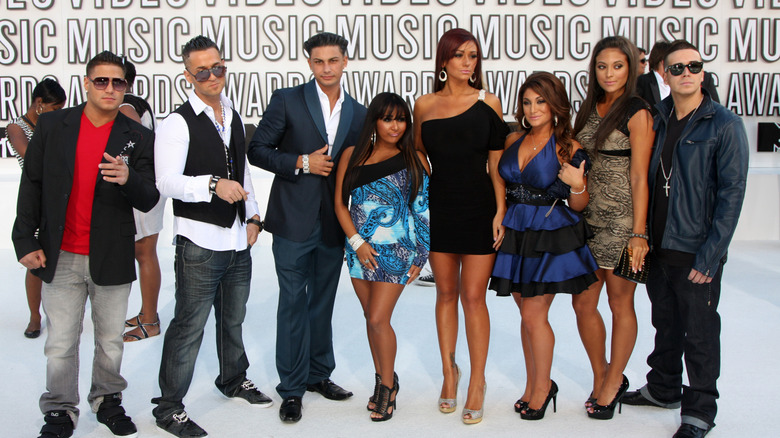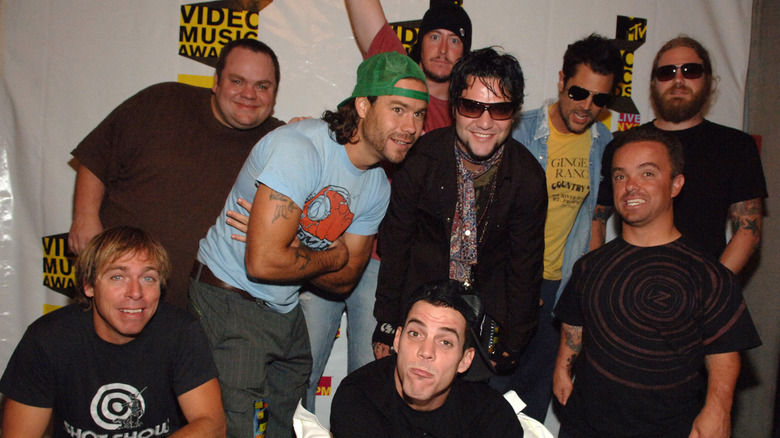Massive Scandals That Rocked MTV
MTV hit the U.S. airwaves on August 1, 1981. For kids and music lovers in the '80s, this was a brand-new way to enjoy their favorite bands. While music videos had existed before, now they were streaming into people's homes (assuming they had cable) basically 24 hours a day. It is hard to appreciate in the internet age, with every genre of music in any medium available instantly, how revolutionary this was.
The new channel was a huge success, but it managed to find itself in hot water a few times in the early days, even when all it played were music videos. Once MTV stopped playing music videos and started adding other types of programming, and especially when they embraced the reality TV craze, the scandals involving the network started to come thick and fast.
Some of these incidents have faded from memory, while others are still seen as defining cultural moments, but all of them made headlines at the time and led to huge headaches for the people in charge at the network. Here are some of the massive scandals that rocked MTV.
Beavis and Butthead are blamed for a tragic fire
Back in the '90s, most people were probably aware that, even though it was a cartoon, MTV's show "Beavis and Butthead" was not suitable for children. The pair often talked about their love of fire, specifically in the episode "Comedians." So when a 5-year-old boy set fire to his home, killing his 2-year-old sister, their mother blamed the cartoon, saying it inspired her son to play with a lighter. Fire Chief Harold Sigler told The New York Times, "When you ... get these cartoon characters saying it's fun to play with fire, this is going to stick in that kid's mind and it's going to be with him for a long time."
Some people were dubious about placing the blame on the show. "I don't take any responsibility for any of it at all," creator Mike Judge told The Spokesman-Review in 1996. "The fire was obviously a very horrible, sad tragedy. But it had nothing to do with 'Beavis and Butthead.'"
Once the boy grew up, he allegedly said he had never seen the show because they couldn't afford cable. But his mother stuck to her story. Darcy Burk told the New York Post in 2011, "The fire chief asked Austin where he had learned to play with fire, and he said 'Beavis and Butthead.' The girl that I had babysitting was allowing the kids to watch it." What is certain is that a young girl lost her life in a horrible tragedy.
The Super Bowl XXXVIII Halftime Show Controversy
At the end of the Super Bowl XXXVIII Halftime Show in 2004, Justin Timberlake pulled off part of Janet Jackson's top, exposing her breast in an incident that coined the term "wardrobe malfunction." While the Super Bowl aired on CBS, the Halftime Show was produced by MTV. With people in an uproar over the brief nudity, those in charge tried to pass the buck. "We were extremely disappointed by elements of the MTV-produced halftime show," NFL executive vice president Joe Browne said, via Rolling Stone. "They were totally inconsistent with assurances our office was given about the content of the show. It's unlikely that MTV will produce another Super Bowl halftime."
Here's the sad truth about what happened after Janet Jackson's Super Bowl wardrobe malfunction: She was punished, and Justin Timberlake got off pretty much scot-free. Someone was going to have to take the blame, and it ended up being the one Black woman involved. In a statement released a few days later, Jackson said, "The decision to have a costume reveal at the end of my halftime show performance was made after final rehearsals ... MTV was completely unaware of it. It was not my intention that it go as far as it did" (via NPR). Regardless of this act of throwing herself under the bus, MTV effectively blacklisted Jackson from its network.
It wasn't until 2021, when the incident entered the zeitgeist again after the #MeToo movement, that Timberlake finally got around to apologizing to Jackson for not speaking out on her behalf.
The alleged 'Blackout'
In the early days of MTV, some people noticed the network barely played any music by Black musicians. Rob Tannenbaum, co-author of "I Want My MTV: The Uncensored Story of the Music Video Revolution," told The Washington Post, "On the occasions that MTV was playing Black artists, it was only because they had sort of run out of videos." Black artists began talking about this "Blackout," with Rick James in particular being especially vocal in calling out MTV.
Then, white megastar David Bowie sat down for an interview with the network. "Having watched MTV over the past few months... I'm just floored by the fact that there's so few Black artists featured on it. Why is that?" Bowie asked (via Rolling Stone). The interviewer didn't know what to say, and things got awkward. It's not that the rock star's interview went terribly wrong, but Bowie pushed for an answer, and it was clear no good one was forthcoming.
When Michael Jackson released the unquestionable banger "Billie Jean" in 1983, MTV was not inclined to air the now-iconic video. It was the final straw for Walter Yetnikoff, president of CBS Records. He threatened the network: "I'm going to go public and f***ing tell them about the fact you don't want to play music by a Black guy" (via LitHub). He also threatened to pull all the videos they did air by CBS Records artists. "Billie Jean" was put in heavy rotation, and things slowly changed at MTV.
Kanye West interrupts Taylor Swift's acceptance speech at the VMAs
Perhaps no controversy involving MTV has had more of an affect on the culture than when Kanye West interrupted Taylor Swift's acceptance speech at the VMAs in 2009. Swift had just won the Best Female Video award for "You Belong With Me," beating out, among others, Beyoncé's video for "Single Ladies (Put a Ring On It). Jumping out of his front row seat and onto the stage, a very inebriated West grabbed the mic from the confused young woman and said, "Yo, Taylor, I'm really happy for you, I'ma let you finish, but Beyoncé had one of the best videos of all time!" (via People).
Reporter Dave Itzkoff was in the audience when it happened. He later told Billboard, "There was a lot of disbelief and anger in the house, and shock that palpably went through the room. But for me, because I'm so cynical, I presumed it was a stunt that was orchestrated in some way and all the participants had to be in on it."
But they were not, and the infamous incident resulted in years of back-and-forth controversies and mud-slinging. Even President Barack Obama weighed in on the situation shortly after it happened, calling West a "jackass." Swift referenced the drama many times over the years, as recently as during her Eras Tour, where she made a reference to being interrupted that was clearly meant to be about the VMA incident with West.
The Dude, This Sucks poop incident
You probably don't remember the MTV show "Dude, This Sucks," and that's because it was canceled over a gross controversy before it even aired. During the filming of the pilot for what was supposed to be a new variety show, two 13-year-old girls, Monique Garcia and Kelli Sloat, were told to stand next to the stage while a group, the Shower Rangers, performed.
At a press conference alongside lawyer Gloria Allred, Garcia explained what happened next (via ABC News): "All of a sudden, I was smelling something disgusting and I started to gag. I looked around at my friends. They were covered in something. As I looked down at myself, I realized that I was, too." That's because the Shower Rangers had exposed their rear ends and defecated on the audience. This resulted in a lawsuit, especially as it was clear those involved knew what was about to happen, since the girls said they noticed all the cameramen covering up their equipment before the performance started.
In a statement, MTV's president of programming, Brian Graden, said, "This was a terrible incident. It was unintended, and we regret that it happened. I was not aware of the content of this segment prior to the taping and have taken steps to ensure that an incident of this nature never happens again ... The footage from the show, part of a pilot taped on remote location, has never and will never air."
The short-lived and scandal-plagued Fraternity Life
When the MTV show "Sorority Life," following college women in Greek life around for a reality show, was a hit, they tried a spin-off with men called "Fraternity Life." Its two seasons were marked by controversies that had other fraternities saying it was an inaccurate representation of Greek life. Collegiate Greek life has a dark history, but then MTV was probably counting on some drama and controversy; otherwise, why bother sending a film crew at all?
The first season followed the University at Buffalo fraternity Sigma Chi Omega, while the second featured Delta Omega Chi at UC Santa Cruz. Both were local frats, rather than the more famous and longer-lived national ones. According to Jay Hosack, who was then the UCSC volleyball coach and a volunteer adviser to Greek organizations at the school, this was by design: "MTV only chooses locals because nationals have governing bodies. Locals don't have anybody to say 'no'" (via UC Santa Cruz Currents).
It ended badly for both frats. The first season resulted in punishments meted out to Sigma Chi Omega and some of its members when footage showed them engaging in hazing rituals, as well as breaking into the Buffalo Zoo. In the second season, two members of Delta Omega Chi stole a famous 18-inch koi fish named Goldie from a pond on campus, then barbequed and ate it. The theft of the fish was recorded by MTV, but not aired. Regardless, the show was quickly canceled.
Andrew Dice Clay's offensive performance at the VMAs
Andrew Dice Clay was known for his over-the-top and offensive stand-up comedy routines, so MTV shouldn't have been surprised with what happened when they booked him for the VMAs in 1989. The comedian did three minutes of stand-up before introducing Cher, including his trademark raunchy nursery rhymes. Producer Dick Clark and host Arsenio Hall were watching backstage. "Arsenio had to jump [Clark] to stop him from getting on camera," Clay recalled on the "Talk Is Jericho" podcast (via Ultimate Classic Rock). "He tackled Dick Clark, because Dick was going to tackle me."
The performance generated so much controversy that it resulted in a "lifetime ban" from future VMAs, although not everyone was for it, according to Clay. "They get all these top dogs of MTV together, and they're all like, 'Dice is banned for life. He's never going to be allowed on MTV again,'" Clay said. "And Dick Clark, as calm as can be ... He goes, '... Why would you want to ban him for life? I'd have him back next year.'"
Clay was finally allowed to return to watch the 2011 VMAs, which Lady Gaga opened by doing a routine as the foul-mouthed "Jo Calderone" that reminded many of a female version of Clay's act. "It was sort of mind-blowing to me because of the fact that I was banned all those years ago," he told ABC News. "Watching her up there as Jo Calderone, I was sort of wondering, 'Is this why they wanted me here?'"
The original Spring Break programming and the decision to reboot it
If you grew up watching the network in the '90s and early 2000s, you might wonder, "Hey, what happened to MTV's Spring Break?" There was a point when MTV's annual raunchy coverage of a week of college kids partying on the beach was ubiquitous. It actually lasted almost three decades, starting all the way back in 1986, despite plenty of controversy during that time.
The problems with getting a bunch of young people in one place, putting them in swimwear, and getting them drunk should have been obvious. The towns that hosted them rarely wanted the network to come back again because of all the problems the event caused. There were attempts to tone things down over the years. After one year saw accusations that exotic dancers had been recruited for a bikini contest, the next year's was a bit tamer. "MTV provided us with the bathing suits. No thong bikinis were allowed," Jaime Torres, who competed in the contest, told the LA Times. "We couldn't do certain dance moves. No grinding, no rump shaking. They kept saying they didn't want controversy. That this was family entertainment. They stressed family, family, over and over again."
As tastes and sensibilities changed, MTV's Spring Break was slowly phased out and then finally canceled altogether in 2014. So the decision to bring it back in the wake of the #MeToo movement was hugely controversial. People took to Twitter to ask what MTV was thinking.
The depiction of Italian Americans on Jersey Shore
At the height of the reality TV era in 2009, MTV announced a new show called "Jersey Shore." It was controversial before the first episode even aired, thanks to the offensive depiction of Italian Americans that was clear in ads for the show alone. This led to a huge uproar from Italian-American groups over the use of ethnic slurs and offensive stereotypes.
"The show is an attack on Italian Americans altogether and its end result is stereotyping," New Jersey State Assemblyman Ralph Caputo said, via UPI. "One would like to think that MTV would have higher programming standards than this." Many people took offense to the use of the term "guido" to describe people of Italian descent, as it was considered highly offensive. Then there were the problems locals foresaw with how the Jersey Shore itself was portrayed in the show. They worried it would both turn people off from coming there and attract visitors that locals were not thrilled about. "The program certainly depicts the Jersey Shore as a culturally vapid place and doesn't make it appealing to anyone outside the demographic [MTV] is showing," Daniel Cappello, the executive director of the Jersey Shore Convention & Visitors Bureau, told ABC News.
Despite (or perhaps because of) the controversy, "Jersey Shore" would end up being a huge hit. It ran for six seasons and was rebooted as "Jersey Shore: Family Vacation" with the original cast in 2018.
Jackass copycats
There are plenty of heartbreaking stories about the cast of "Jackass," but even sadder are the fates of some of the regular people (usually kids) who tried to imitate the guys they saw on MTV. "Jackass" copycat stunts often resulted in serious injuries and even deaths.
It's not that the network didn't see that this was a possibility before the show even aired. In 2001, Brian Graden, MTV's president of programming, gave an interview to the LA Times and explained how they tried to head off this problem from the beginning: "Most of the stunts are of a caliber that they couldn't be imitable because you need all these wild props and professionals and all that." He added, "If you watch the show, it's almost ridiculous in terms of the number of warnings we put on it."
Eight days after he gave that interview, a 13-year-old was badly burned after pouring mineral spirits on himself and setting himself on fire. The next year, a 15-year-old died trying to replicate a stunt from the "Jackass" movie by jumping onto a moving car. "My heart goes out to the kid's family, but we've done everything we can to prevent this type of thing from happening," star Johnny Knoxville told The Knoxville News-Sentinel after the teen died (via the LA Times). "In every interview I have ever given, I have stressed: 'Don't try this at home.'"
